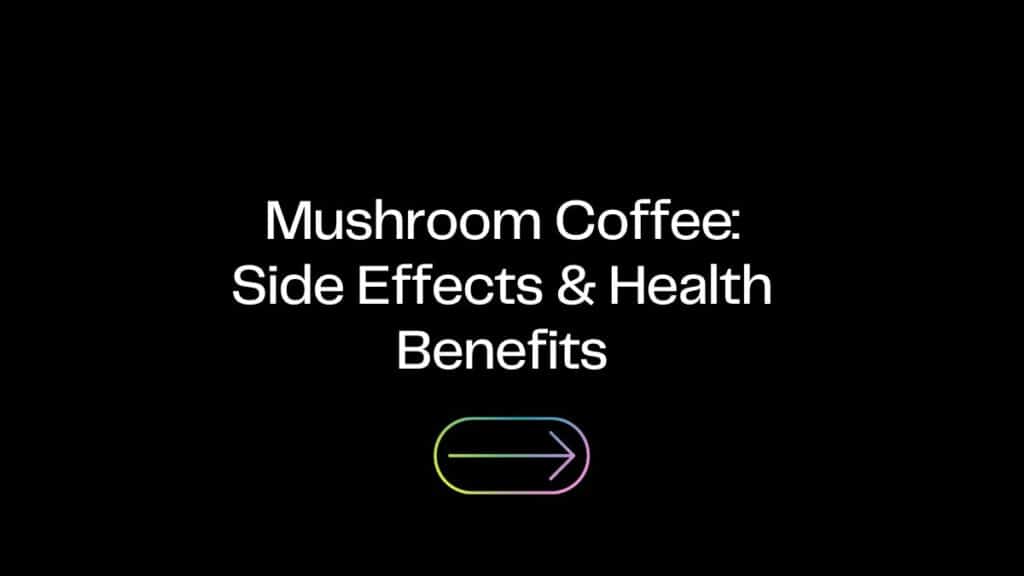Mushroom coffee is a trending blend that combines traditional coffee with mushroom extracts. It’s celebrated for its potential health benefits and unique taste. However, like any other supplement or modified food item, it’s important to weigh its side effects and potential risks alongside its benefits. This article delves into what mushroom coffee is, its potential side effects, the types of mushrooms used, and considerations for its consumption.
Key Takeaways
- Mushroom coffee can cause side effects such as jitters, anxiety, increased heart rate, nausea, diarrhea, and increased risk of kidney stones.
- Not all mushrooms in mushroom coffee have the same effects; some, like Lion’s Mane or Cordyceps, have specific benefits and potential side effects.
- Despite concerns, mushroom coffee is non-psychedelic and is considered safe for most people, though individuals with certain conditions should avoid it.
What is mushroom coffee?
Mushroom coffee is a fusion of ground coffee beans and various mushroom extracts. This innovative blend aims to combine the energizing effects of coffee with the purported health benefits of medicinal mushrooms. Unlike regular coffee, mushroom coffee is said to deliver a smoother, less acidic taste and a more balanced energy boost, without the typical caffeine crash.
Potential Side Effects of Mushroom Coffee
Jitters or Anxiety
The caffeine in mushroom coffee, while potentially lower than traditional coffee, can still cause jitters or anxiety in sensitive individuals.
Increased Heart Rate
As with most caffeinated products, an increase in heart rate is a possible side effect.
Nausea
Some individuals may experience nausea, especially if they consume mushroom coffee on an empty stomach or are not accustomed to mushrooms.
Diarrhea
Both coffee and mushrooms are known to stimulate digestion, which can lead to diarrhea in some people.
Increased Risk of Kidney Stones
Certain mushrooms contain oxalates, which can contribute to kidney stones in predisposed individuals.
Allergic Reactions
As with any product containing fungi, there’s a potential for allergic reactions among those sensitive to mushrooms.
What kind of mushrooms are in mushroom coffee and what are their side effects?
- Organic Lion’s Mane Mushroom Extract: Believed to improve memory and focus, but can cause discomfort in people with mushroom allergies.
- Organic Reishi Mushroom Extract: Known for immune-boosting properties; possible side effects include dryness of the mouth, throat, and nasal areas.
- Organic Turkey Tail Mushroom Extract: Supports immune health but may cause digestive upset.
- Organic Maitake Mushroom Extract: Aids in controlling blood sugar and boosting immunity. Rarely, it can cause allergic reactions.
- Organic Cordyceps Mushroom Extract: Increases energy levels; potential side effects include nausea and diarrhea.
- Organic Chaga Extract: Offers antioxidant benefits but could interact with blood-thinning medications.
Is mushroom coffee psychedelic?
No, the mushrooms used in mushroom coffee are non-psychedelic, meaning they don’t contain psychoactive substances like psilocybin found in magic mushrooms. Therefore, mushroom coffee doesn’t produce hallucinogenic effects.
Is mushroom coffee safe?
Mushroom coffee is generally safe for most people when consumed in moderation. However, its safety can vary based on individual health conditions, potential allergic reactions, and the possibility of interacting with certain medications.
Is mushroom coffee good for you?
The benefits of mushroom coffee include potential improvements in focus, immunity, and energy, with fewer of the side effects associated with high-caffeine drinks. However, these benefits can vary widely depending on the individual and the specific mushroom extracts used – but still, mushroom coffee is trending for a reason!
Remember:
- Medicinal mushrooms have been used in traditional Chinese Medicine for hundreds of years.
- Adaptogens have been known to improve body’s response to stress.
- Mushrooms have been studied for their benefits on improving immunity
- Chaga mushrooms may help fight ulcers.
- Reishi extracts have shown potential for reducing blood cholesterol levels and reducing the risk of heart disease.
Who Shouldn’t Drink Mushroom Coffee?
- Individuals with allergies to mushrooms.
- People with certain health conditions where diet needs to be carefully managed.
- Those currently taking medication that could interact with mushroom extracts, particularly blood thinners or immune-suppressing drugs.
Where to Get Mushroom Coffee
Mushroom coffee is one of our most popular products – and if you’re looking to compare a range of brands on the market then you review this article on the best mushroom coffee products.
Mushroom coffee offers an intriguing blend of benefits, potential consumers should approach it with a balanced view of its possible side effects. Personal health conditions, sensitivity to caffeine and mushrooms, and specific wellness goals should guide the decision to incorporate mushroom coffee into one’s diet. As with any dietary change or supplement introduction, consulting with a healthcare provider is recommended.

